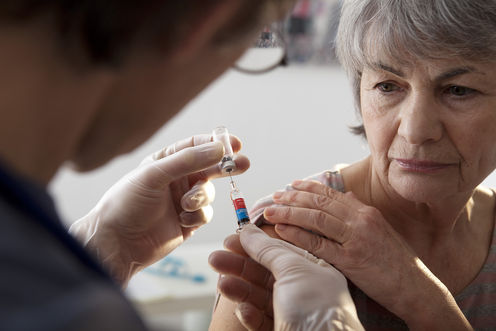
We live in an ageing society, with the global median age rising steadily. Australia’s economic viability will increasingly rely on retaining older people in the workforce for longer. This, of course, relies on keeping older people healthy into old age – and immunisation can play an important role.
Free vaccinations
The federal government recommends Australians 65 years old and over be vaccinated against influenza and pneumococcal disease – common illnesses that pose a higher risk of complications and premature death in older age. These vaccines are fully subsidised for over-65s and other high-risk groups.
Yet compared with children, who are also eligible for free vaccinations, elderly vaccination rates are low. More than 90% of children are vaccinated age appropriately compared with 74% of adults aged over 65 years.
This could be because doctors don’t value vaccines for over-65s as highly as vaccines for children because older people have weaker immune responses and generally cannot respond as well to vaccines.
Weakening immunity
When babies are vaccinated, the immune system matures and strengthens with each dose. But the immune system starts to decline around the age of 50.
Countering this progressive loss of immunity with vaccination requires novel approaches to boosting of immune responses. This can include giving extra doses, using adjuvants (extra substances) and using different modes of vaccine delivery such as injecting into the skin rather than the muscle, which stimulates a higher immune response.
Despite weaker immunity, most vaccines still have significant benefit in older age. Recent research shows that even those with no immunity to pneumococcal vaccines can mount a robust immune response once vaccinated.
Unequal burden of disease
Older people have a far higher risk of contracting vaccine-preventable infections and severe complications than younger people. Influenza, pneumococcal disease (a common cause of pneumonia) and herpes zoster (shingles), for instance, are much more common in older age.
Other diseases such as whooping cough (pertussis) are now also causing illness and even death in older people.

Nursing homes and long-term residential facilities also suffer a disproportionate burden of severe outbreaks of infectious diseases such as gastroenteritis and influenza. Research shows that vaccinating nursing home residents is highly effective at preventing outbreaks. Yet vaccination rates are suboptimal, among both residents and staff.
There is also growing evidence that influenza vaccination prevents heart attacks, because infection is a risk factor for acute clotting and blockage of arteries. But again, many patients at risk of heart attacks are under-vaccinated.
Disease burden vs immune response
The impact of vaccines is not only a factor of immune response to the vaccines, but also to burden of disease.
If there are 100 cases of disease X in people aged 20 to 50 years, for example, and the vaccine is 90% effective, we could prevent 90 cases of disease. In contrast, if there are 1,000 cases of disease X in people aged over 65 years, but the vaccine is less effective in older adults – say 60% instead of 90% – we would be able to prevent 600 cases of disease.
In terms of population health benefit, then, it’s better to vaccinate older people who have a higher burden of disease but reduced ability to respond to vaccines, than to vaccinate younger people who have a lower burden of disease and better ability to respond to vaccines: 600 cases prevented versus 90.
Because of this lower efficacy, health-care providers often dismiss vaccination for older people as worthless. But compared with other preventive health measures – such as statins for prevention of heart attacks, which are approximately 25% effective – most vaccines for over-65s are far more effective.
Ageism, ethics and value judgements
“Pneumonia is the old man’s friend” is a common saying, laden with value judgement. This implies that old people shouldn’t bother with treatment – or prevention. It also assumes older people have less rights to autonomy and self-determination, and that they are at the mercy of others when they are vulnerable and ill.
Research shows that people over 80, nursing homes residents and those with conditions such as dementia are less likely to get vaccinated. Yet these same people are likely to be admitted to hospital when they develop acute infections.
Prevention with vaccination is a better option than treatment after the event, from any perspective: cost-effectiveness, use of health-care resources, risk to others, and ethics. If we’re serious about healthy ageing, we need to address the pervasive ageism in health care and ensure people of all ages have the opportunity to prevent illness through vaccination.
The NHMRC Centre for Research Excellence in Population Research Health will convene the workshop Equity in disease prevention – vaccine for the elderly in Melbourne on Friday June 20. Registration is free.
Raina MacIntyre has been on advisory boards for vaccine manufacturers GSK, Pfizer and Merck. She is also on expert advisory groups on adult vaccination for the WHO SAGE (VZV working group), the Australian Technical Advisory Group on Immunisation working groups for influenza and pneumococcal vaccines; She is a Director of the Influenza Specialist Group; she has receives funding or in-kind support for investigator-driven research from the NHMRC, ARC, GSK, BioCSL and Merck. She works for UNSW and the National Centre for Immunisation Research and is Director of a NHMRC Centre for Research Excellence in Immunisation,
